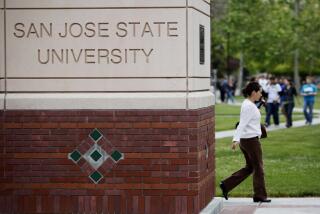Budget Cuts Rip Into Heart of Education : Teaching: Elimination of SDSU religious studies program robs students of a passionate, dedicated instructor.
Irving Gefter has lost his job. My friend, who taught religious studies at San Diego State University for more than 20 years, was a tenured professor and is now unemployed.
For 22 years, Gefter pursued two passions: to teach and to learn. He taught his university students about the worlds of ideas and reality, and then, when school was in recess, he went seeking new experiences. He traveled through woods and forests, plains and parks, breathed fresh air, read copiously, slept in the outdoors and collected ideas and memories to share with his students.
Then came the devastating blow. Nine departments at San Diego State University were to be obliterated, dynamited, destroyed. Many others were to be trimmed and thinned by economic liposuction. Gefter’s Department of Religious Studies fell victim.
Religious studies are courses that explore the personal, intimate beliefs and religious practices of people throughout history and in all the world. Students learn about values, where they come from and how they differ, what religious ideologies preach, what their adherents practice, where they meet and where they separate.
Today, in San Diego County, we continue to disagree about public school prayer and we vote to keep a Christian symbol hovering over people called San Diegans who represent a variety of religious opinions and practices. While we as a community search for guidelines that will lead to religious tolerance and freedom, our state university chooses to excise from its curriculum the very courses that enhance that understanding.
My friend, Irving Gefter, is angry. He recalls that this is the second time in 10 years that such a cut has been proposed. Last time, the chaos was avoided. A public outcry saved religious studies, among others. This time, furious murmurings about VIP salaries and bonuses and administrative costs have no clout. Student concerns about credits and degree programs have no clout. The concerns raise nagging questions: Whose values determine public expenditures for education? Do our university administrators believe that, when in the privacy of the ballot box we voted YES on university repair and construction bonds, we were approving bloated administrative costs?
Two months ago, Gefter and I discussed his retirement. I asked Irving what teaching means to him. “It is my way of life,” he said. He has taught around the world, in Israel, Canada and from coast to coast in the United States, tirelessly motivating young people to stretch their minds and their attitudes. Has he been successful? He shared the “evaluations” that his students turned in at the last class. In answer to the already obsolete question, “How would you change this course in the future?” many wrote “Reinstate the course” or “Don’t let this professor go!”
Comments from students ran from praise for a professor who cared, who listened and who shared, to serious evaluations of a course that changed their thinking. Many noted that they had enrolled in what they thought was an easy credit course and stayed to learn.
With the kudos of students in his hand, Gefter is baffled and pained. He had planned to retire in four years, at age 65. His financial planning over the years had been geared to the days when a salary check would be traded for a pension check. He is not ready for that trade yet. His calendar for the next four years is filled with lecture notes and student conferences.
The students, too, are not ready. So many had agonized over a choice of majors; so many had carefully planned their course of study, knowing what “had” to be taken to graduate in their major. So many are now left with huge gaps in their plans. The courses needed for graduation may no longer exist.
So, what can a professor do when he finds that the last, culminating, satisfying piece of his career has been denied him? My friend is not ready to stop teaching. Several of us are trying to help him face retirement. We point out that unexpected freedom has advantages: freedom to lecture when invited; freedom to read whenever the spirit moves him; freedom to travel anytime of the year; freedom to kick back and recycle his many skills. But my friend is not yet ready to listen. He mourns the sudden amputation of his career.
The university, a giant whose tentacles reach into so many lives, will, in time, regenerate. A limb that is cut off today will grow back on some tomorrow. Religious studies and all of the other now-deceased disciplines will eventually be returned, for they belong in a university that is worthy of its title. But that is little consolation for today’s victims: the students whose majors have disappeared and the students who looked forward to next year’s program of classes. It is certainly no consolation to my tenured friend and his colleagues, who, in these last, previously secure, years of their careers are left with an empty bag labeled satisfaction and fulfillment.
More to Read
Sign up for Essential California
The most important California stories and recommendations in your inbox every morning.
You may occasionally receive promotional content from the Los Angeles Times.










